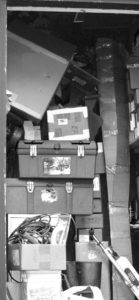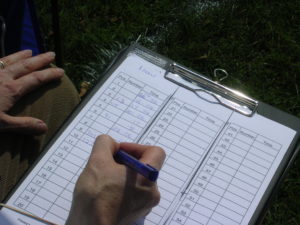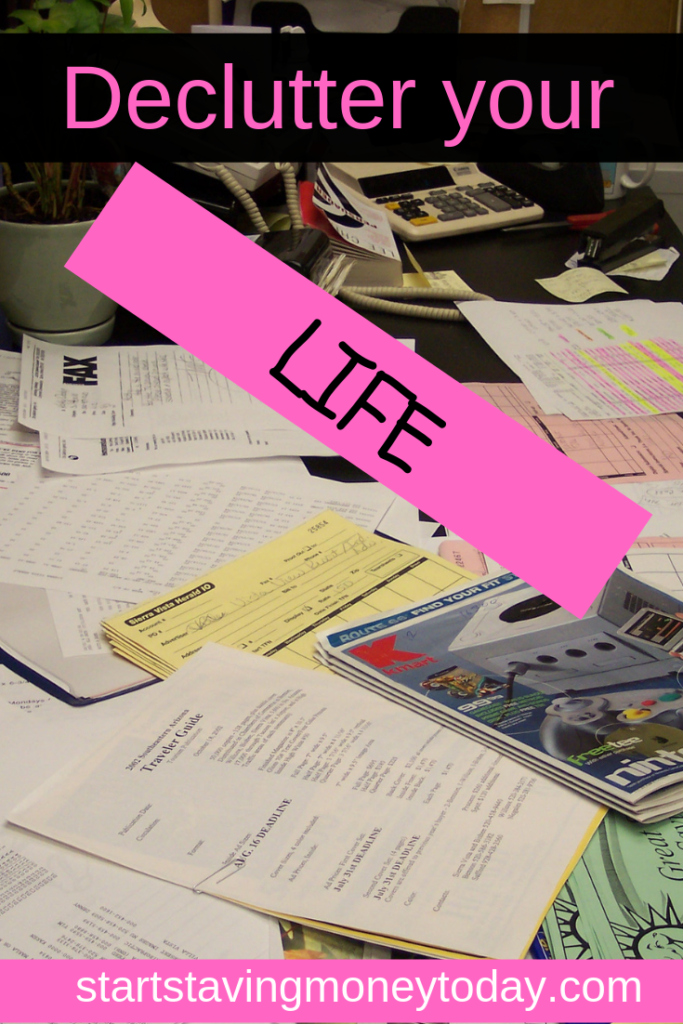Declutter your life
It’s almost too easy for our lives to get all cluttered up. I’m not just talking about physical clutter. I’m including emotional and mental clutter. All forms of clutter are bad. Clutter slows you down; it can keep you from reaching your goals. To be frugal, we need to declutter your life.
According to Merriam-Webster, clutter is “a large number of things that are not arranged in a neat or orderly way: a crowded or disordered collection of things.” Some synonyms for decluttering are clean out, get rid of mess, straighten up, organize and throw away.
Let me ask you a question . . . Do you think you get a lot done? Maybe you do, or maybe you feel bogged down. Either way, could you get a lot more done if you weren’t dealing with disorder or litter—clutter?
I want to talk about decluttering.
Disorder and litter
Short story
Early in my college career, I was one of the most disorganized people you’d have ever met. I’d return to my place from class and drop whatever I was carrying in the first clear spot I found. If there wasn’t a clean spot, I’d look for a pile that didn’t look like it’d fall over. You must realize I was always losing track of something. That means I was always looking for something. What a waste of time! And, if I couldn’t find what I was looking for? It could cost money. Sometimes, it even cost me a decent grade on a paper or project. To allow things to run to disorder means you are constantly working against yourself. You can accomplish a lot more in less time with less stress if you have order.
To have order, you need to declutter your life. Things need a designated place, and you need to put things where they belong. Be organized. Also, get rid of what you don’t need or things that don’t help you. (This applies to more than physical things.)
I will tell you this: I didn’t learn my lesson until I got a roommate who was just as disorganized as I was. Clutter is bad enough when you live alone, but when you live with someone who contributes to it (like a roommate or spouse), the problem doesn’t just double. It will increase exponentially.
Here’s my definition of clutter
Clutter is stuff that’s where it doesn’t belong. That’s why “litter” is a good synonym. If stuff is out of place, maybe it has no place??? Maybe, you no longer have room for it. Maybe, you don’t need it. Maybe, you don’t even want it? Or, maybe, it just didn’t get put away. Whatever the reason, it’s litter—clutter. In order to be frugal you need to declutter your life.
Clutter comes in many forms. Three of the main ones are physical, emotional, and mental. Without going into too deep an explanation about these different kinds of clutter, I want to talk about resolving the messes they make as we pursue a frugal lifestyle.
Tips for decluttering your life
Physical Clutter
Physical clutter is that mess you find in your home or work area (maybe in your car???). It develops from things having no designated place or being out of place. In other words, it comes from dumping stuff, such as the mail, on the dining room table until you need it. Later,  you’ll be rooting through perhaps weeks of mail just to find that one bill that’s due tomorrow. And forget about eating at the table, it’s too messy to be used for that . . . .
you’ll be rooting through perhaps weeks of mail just to find that one bill that’s due tomorrow. And forget about eating at the table, it’s too messy to be used for that . . . .
The garage is another place clutter tends to accumulate. Or, if you don’t have a garage, you designate a closet or a room to hold junk. A lot of us even outgrow those spaces and buy a shed or rent a space for storage. The point is we don’t deal with our stuff, we just move it, and if it’s out of sight, it’s out of mind. But, it’s not out of our lives, and it’s costing us money to hang on to (and, probably, still needs to be decluttered).
The thing about stuff
The problem with having a lot of stuff is that you don’t own it. It owns you. You have to store it, clean it, recharge batteries, buy new batteries, reboot it, oil it, or paint it. You have to care for all of your stuff. If you don’t, eventually it becomes useless.
Here’s an example: Camping season was over late last fall. You put your gear in your storage unit. The unit was already messy, and you were in a hurry, so you just stuffed things wherever you could. That included your flashlight, and you didn’t take the minute it would have taken to remove the batteries. Now, it’s Spring, and you’d like to go camping next weekend. You’re going by your storage unit today (Wednesday) to collect your stuff and get ready . . . That took a while—well, quite a while. You had to search through everything because the camping gear was scattered. Also, you need to buy a new flashlight (and batteries); the batteries leaked, and that flashlight is never going to work again (not to mention the other things around it that got messed up and should be tossed).
You just wasted a bunch of time. If everything had been (properly) stored together, this trip could have been as simple as a five-minute stop to pick up one box or tub. You’ll need to replace that flashlight before you go next weekend—and it wasn’t a cheap one. (Also, at some point, you’ll probably be replacing some of the other stuff the battery fluid leaked on.) Because you allowed clutter, you’ve wasted time and money. That’s not frugal.
The declutter your life Solution.
Dispose of what you have not used in the last 12 months
And, yes, I know there are things we need to keep, but do we need everything that clutters up our lives? A rule of thumb says if you haven’t used something in the last year, you probably won’t use it again. If that’s the case, you need to get rid of it. Sell it on craigslist or eBay. Yard sales are another way to make a little extra money. As you declutter your house, you are decluttering your life.
Organize your stuff
After you’re rid of the stuff you don’t use anymore, take the time to put things where they belong. If they’ve never been assigned a place, give them one, and when you’re done using something, put it back in its place. A lot of clutter is stuff we intend to use again soon, so instead of putting something away, we just keep it handy. Unfortunately, “soon” doesn’t always come, and in the meantime, whatever we’ve left out of place is joined by several other things left with good intentions.
Put things where they belong.
Things left lying about can get lost or broken. When you put things away correctly, you reduce clutter and protect your belongings: You’ll spend less on duplicate purchases and save the time you’d use searching for or replacing an item.
Emotional Clutter
Dealing with feelings can seem difficult at best. We’ve all been there. Too often, we nurse the memory of a hurt or betrayal.
Don’t focus on hurtful memories.
Often, emotional clutter is the dregs of the past. If we’re constantly reliving the past, it’s hard to deal with the present. Health gurus say, “You are what you eat.” When we feed on unpleasant memories, we become less productive, possibly accident prone, or depressed. We can’t accomplish what needs to be done now. When the past takes up too much of the present, it’s out of order; it’s in disorder; it needs to be put in its proper place. It’s important to relegate past emotional trauma to the past to have a meaningful present.
Declutter Solution
There’s a fairly simple solution to emotional clutter: Don’t dwell on negative experiences from the past. We’ve all had them: loss, relationships went bad, offenses. . . . Those things are real, but they’re in the past. We can’t change them. Right now, concentrate on what you want/need to be doing to accomplish your goals. Live in the present. Plan for the future. Would you rather be slowed by the weight of baggage—relive unpleasant experiences from the past—or have the freedom to move towards the future with its potential for positives? There’s a saying that goes, “You get what you focus on.”
Refuse to dwell in the past
When you have negative thoughts, refuse to entertain them.
Ok. About now, you might be thinking something like, “Stop with the platitudes.” I’ll give you this: The idea of letting go of emotional memories is easier than the act. It requires determination and strength, but when emotions threaten to overwhelm you, train yourself to think about something better. It is like a regimen of weightlifting exercises; practice/repetition leads to strength. Rather quickly, you’ll have long periods when you don’t consider clutter from the past. You’ll have gone a long way to declutter your life. You’ll be too busy??? too happy??? to spend time in the past. Thinking about the present and future possibilities will build a positive mindset (and we tend to get what we focus on).
Mental Clutter
How do you feel when you have too much going on? Too much to do? Do you know how hard to find your things when they’re in disorder and when your space is cluttered up? Well, it’s often that hard to know what to do next when there’re too many things clamoring for your attention “NOW!” Mental clutter litters the bridge between thought and action.
The problem with mental clutter
When we have too much on our minds, it can be overwhelming, perhaps depressing, and certainly tiring. Mental clutter can be the result of too much to do or too many worries. It can lead to frantic activity or absentmindedness. (And, sometimes, it’s hard to tell which one of these is in effect.)
Are you so caught up in “getting things done” that you constantly miss appointments or important family activities? Maybe you skip your lunch break to meet deadlines? Take work home (all the time)?
It’s fairly easy to come up with work situations that impose on our private lives, but sometimes it goes the other way. I’ve known people who lost their jobs because they were constantly sneaking out of work early and missing deadlines because they needed to run their kids around. Or, how about the college student who wants to drop out because he never really learned how to study?
Mental clutter usually equals a life in disorder; it needs to be decluttered.
Mental Solution
Prioritize and organize your tasks
So. You have too much on your mind. Well, just as you do with emotional clutter, you need to put things into perspective, and as with physical belongings, you need to get rid of or impose order on the litter.
Prioritize. Make a short to-do list that can be updated as you work through it. A list keep can keep you moving smoothly from one task to the next (especially if you include time parameters). Keep your list short. It should include only things that need to get done. I use a graded system of A through C. A items are the most important. C items are the least. I make it a point to complete the things designated with an A. Most Cs don’t get done; generally, C items are waiting to move up in priority (or to be discarded). Also, remember the time element: It’s often more productive to work on something for a while and then move to another project rather than try to see one project all the way through at once. We can appreciate the progress as we see several projects advance. Also, our subconscious tends to keep working; we often get inspiration for something while working on something else.
What’s more important? Purge your to-do list
When I said make a list, I meant a list of everything, not just work items. You need to include family and social obligations. Include things that are truly personal also.
When I have a real conflict over things I need or want to do, I ask myself if doing something will get me closer to my goals or hold me back. (This might not resolve things 100%, but generally, it works on the important issues.) For example, Many of you know I plan to “retire” to Thailand. I’m studying Thai, so when I get there, I’ll be able to communicate with local people. If, on Tuesdays, I have not done my Thai studies and it’s time for NCIS New Orleans (my favorite) to come on, what should I do? I ask myself, “What will get me closer to my goal, watching NCIS or studying Thai?” The correct answer is to study Thai (ultimately, it’s more important), and maybe I can catch NCIS next time. I won’t cheat myself and try to do both. That will result in frustration and wasted time. I pick the more important and do it. Besides resolving mental clutter, it’s a frugal thing to do.
It’s important to declutter your life anywhere you find clutter.
The takeaway from decluttering your life
A cluttered-up life is a distraction from really LIVING. When you are distracted, whether by physical, emotional, or mental clutter (possibly a combination of all of them), you’re in a navigational nightmare, you can’t see the way to achieve your goals; your future is murky. Declutter your life and keep the things that remain in order so that you can effectively deal with what needs to come next.

